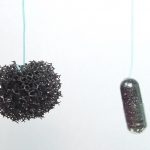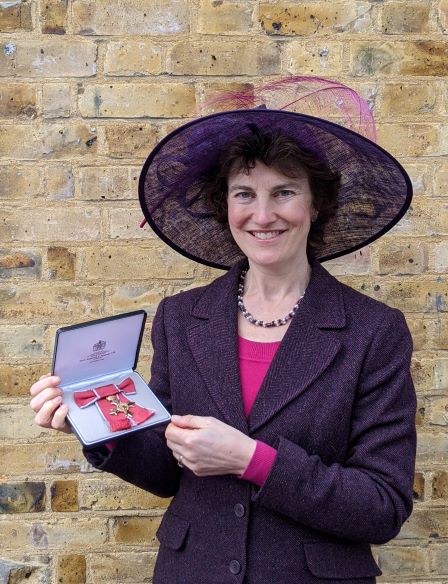Rebecca Fitzgerald OBE MACantab. MD FMedSci EMBO is Professor of Cancer Prevention at the University of Cambridge. She is Director of the newly established Early Detection Institute which is part of the Cancer Research UK Cambridge Centre, and also leads the Cambridge member centre for the CRUK International Alliance in Early Detection (ACED). Rebecca practices medicine as Hon. Consultant in Gastroenterology and Cancer Medicine at Addenbrooke’s Hospital. The focus of her own research group is to investigate the steps in malignant transformation in the oesophagus and stomach and to use this information to improve clinical early detection strategies. Her work to develop and implement the Cytosponge and related biomarker assays for detection of Barrett’s oesophagus and associated dysplasia has been awarded a number of prizes including the Westminster Medal, the BMJ Gastro team of the year, an NHS Innovation prize, the CRUK Jane Wardle Early Detection Prize, the Don Listwin Prize and recently the CRUK Horizons Impact Award. In 2013, she was elected as a Fellow of the Academy of Medical Sciences and in 2021 elected a Member of EMBO. Rebecca is committed to teaching and is a Fellow of Medical Sciences at Trinity College Cambridge. She was recently awarded an OBE for her services to cancer.

Rebecca spoke to us in Aug 2020 about the Cytosponge ‘sponge on a string’ device her team has developed for detecting Barrett’s oesophagus (and early oesophageal cancer), and the BEST3 trial looking at the Cytosponge’s effectiveness in primary care.
Today we have the pleasure of learning more about Rebecca as she answers our ‘5 minutes with series’ questions:
When/where do you get your best research ideas?
I enjoy cycling to and from work – it is mainly off road and so I can let my mind wander: I often reflect on my research and I can sometimes have ideas that don’t come to me when I am sitting at my desk. Travelling is generally a good time to think outside of the box: I remember a long haul flight to San Francisco in which I realised the potential of Cytosponge for diagnosing a range of conditions of the oesophagus, leading to a patent filing when I got back.
Which failure(s) changed you the most?
Research is a journey with ups and downs. Successes in my research have been intermingled with many frustrations, for example when there are unexpected delays or results don’t turn out as expected. I learned early on, and with the benefit of hindsight, that these setbacks can lead to improved understanding and better results – as Max Perutz famously remarked: “In science, truth always wins”. In my very first research project I was testing the effects of low pH on Barrett’s cells, as acid is one of the known risk factors for Barrett’s oesophagus. The results I got were very surprising – the acid exposure seemed to stabilise or kill the cells. On reflection I realised that in human physiology the exposure is pulsatile and not continuous, and when I changed the experimental paradigm I got different results – intermittent acid exposure led to cells dividing more rapidly and to DNA damage.
It is also important to persevere, because if you have confidence in the aims of your research then it will generally take time, with a series of iterations, to realise the goals. With Cytosponge, a test to detect cancer of the oesophagus early, it has been very important to persevere and refine the idea multiple times to improve the design of the device, and to alter the laboratory processing to maximise the accuracy of the test. In these cases listening to other people with expertise in a range of complementary disciplines has been crucial.
What is the best piece of advice (work or life) you’ve been given?
My father always used to say to me at the beginning of each term “work hard and play hard”. This is a good maxim – I love my work but I am also very fortunate to have a number of interests outside of work, such as music that transports me to another world. I have also brought up four children who required me to give them my full attention when I got home from work. You can’t work 24 hours a day 7 days a week, even if the digital age and social media often seem to demand an instant response. Having some time to rest and enjoy other pursuits can lead to much better concentration and success at work.
I’m inspired most by:
Talking with people who have made a difference to others no matter how big or small, and without seeking personal reward. In my daily work and leisure time, as well as in my travels around the world to academic conferences, grant review boards and workshops, I am incredibly fortunate to meet all sorts of people with some incredible stories to share. At a dinner for academics recently, I was talking to a researcher in politics who had to balance her work on speaking out about equality for women in an oppressed society with the risks for her family. That conversation put a different perspective on dedication for one’s work.
What’s an event that changed your life?
I wasn’t particularly interested in research when I was at medical school, although the Regius Professor of Medicine encouraged me to think about it. Later on an opportunity arose for me to do some research when my husband got an academic job in Stanford University. Realising that I couldn’t practice medicine in the US, I embraced the opportunity, and sought out an interesting project and found an inspirational mentor who was willing to take me on. This set me on a career path in academic medicine to research early detection of cancer of the oesophagus. I have never looked back.
What’s the next big thing in cancer? What will be the game changers?
Early detection of cancer has been a neglected discipline compared to all the emphasis on personalised therapies for advanced disease. This has changed in the past few years and a huge momentum is now gathering around novel methods to detect cancer before a person has symptoms. This has been fuelled by improvements in technology that mean we can identify very early cancerous changes with exquisite precision. The exact technology and how this is best deployed to ensure ease of access for individuals at high risk, who might not see their doctor conventionally, remains to be seen. However, it seems certain that we, the public, will get much more used to being checked regularly for cancer changes. As we learn how to intercept and prevent cancer without harmful treatment this will become less of a disease to be feared and more of a situation to control.
What is your favourite paper that you’ve published in the last 5 years (the one you’re most proud of)?
It is tempting to say “the next paper” as I am always excited about what is coming next. However, I think the most important paper to date was from my team working with Peter Sasieni and a large group of collaborators at King’s College London: we described how an offer of Cytosponge to individuals on medication for reflux symptoms diagnosed 10x more cases of the pre-cancerous Barrett’s compared with GP usual practice. This work led to individuals getting treatment for early cancer that might not have been diagnosed at a curative stage otherwise. It also paved the way for the definitive screening trial called BEST4 that we are embarking on very soon: this trial will recruit 120,000 individuals to see whether Cytosponge can reduce mortality from oesophageal cancer.
Share this Page

